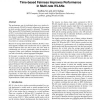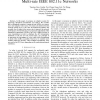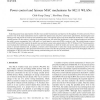21 search results - page 1 / 5 » Time-based Fairness Improves Performance in Multi-Rate WLANs |
USENIX
2004
13 years 10 months ago
2004
The performance seen by individual clients on a wireless local area network (WLAN) is heavily influenced by the manner in which wireless channel capacity is allocated. The popular...
WOWMOM
2005
ACM
14 years 2 months ago
2005
ACM
The IEEE 802.11e extensions for QoS support in WLAN define the transmission opportunity (TXOP) concept, in order to limit the channel holding times of the contending stations in ...
ICC
2008
IEEE
14 years 3 months ago
2008
IEEE
— In this paper, we propose an adaptive system for improving videophone transmission over EDCA. We consider that a videophone contains a constant bit rate (CBR) voice source and ...
ICC
2008
IEEE
14 years 3 months ago
2008
IEEE
—With the availability of multiple rates in IEEE 802.11a/b/g wireless LANs, it is desirable to improve the network capacity and temporal fairness by sending multiple consecutive ...
COMCOM
2007
13 years 9 months ago
2007
Exploiting spatial reuse opportunities will allow more parallel transmissions and improve the throughput of wireless networks. Power control is one of the major mechanisms used to...



